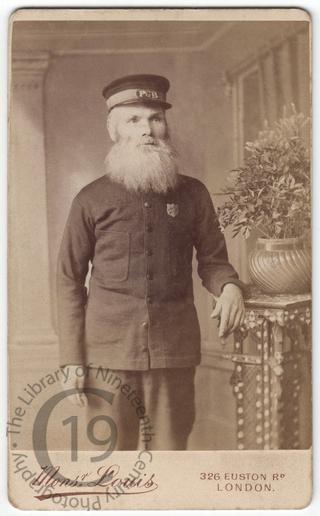
Archie Sloss, known as 'Old Dad'
A carte-de-visite portrait of Archibald Sloss, a former criminal who found Jesus and joined the Salvation Army.
According to an extensive inscription verso in a period hand: ‘The ex-burglar who had spent 40 years in her Majesty’s Convict Prisons was flogged 8 times 50 lashes each time has suffered in all 400 lashes and was converted 19-5-89 at the Salvation Army shelter Clerkenwell. This is old Dad Sloss – the Ex-Duke of Portland – now at the Bridge 30 Argyle Square Kings Cross London. He stands at the Prison Gates every morning trying to help others out of Darkness into the Marvellous Light of his saviour Jesus. God does Bless him in his Good Work.’
Born in Glasgow in or about 1825, he appears on the 1891 census living at 30 Argyle Square in Bloomsbury. The house was a Salvation Army Home for Discharged Prisoners. Some forty or so inmates were presents on the night of the census, under the care of Captain Thomas Hopkins. For his profession, Archie gave ‘Messenger and Porter.’
At one point in his criminal career Archie was transported to Western Australia. Convicted at Glasgow on 12 September 1860, he was sentenced to fourteen years' transportation; he sailed on the Lincelles on 31 September 1861. He left Australia from Albany on 17 March 1873 aboard the Swallow, bound for New Bedford in Maine.
At some point he made his way back to England. Although the recorded age isn’t quite right, he is possibly the Archibald Sloss who was admitted to the casual ward of Homerton Workhouse in East London on 26 September 1881. He described himself as a ‘widower’ and a ‘labourer.’ He was discharged on 1 October 1881.
An account of his life was published in 1897 under the title Archie, or the Confessions of an Old Burglar. A collection of articles by Charles Morley that had previously appeared in the Westminster Gazette, the book was favourably reviewed in several newspapers: ‘Apart from their interest as contributions to the literature of criminology, they are penned with a brightness and sparkle that really make them quite fascinating’ (South London Press, 26 June 1897).
Archie died in the district of St Pancras on 6 January 1900, aged 75. His death was marked by numerous obituaries. According to the Gloucester Citizen (13 January 1900): ‘Archibald Sloss, whose remains were interred at Abney Park Cemetery on Friday, was during the greater part of his life a criminal of the deepest dye. If in the fifties, the sixties, the seventies, or the eighties anyone had ventured to say in the presence of “Archie” Sloss that he – known among his criminal and convict associates in Portland Prison as “The ex-Duke of Portland” – was soon to become “a bright and shining light” as a Christian Evangelist among his fellows, the observation would have probably aroused in Archibald Sloss a flow of language more profane than polite. In his case the unexpected happened, and for ten years he proved the truth of the old adage that “it’s never too late to mend.” He was converted at a Salvation Army shelter, and had since done good work among discharged prisoners at Pentonville, and elsewhere. In the course of his life Sloss served over 40 years in prisons and convict settlements, on eight occasions received forty lashes, and for a period once of six months had to be chained day and night on account of his violence. The funeral car, which was decked with draperies of red, white, and blue, bore the inscription: “Dad Sloss, the notorious burglar. Served forty years in prison. Converted eleven years ago in an Army shelter. Died triumphant January 6th.”’ According to the Derby Mercury (17 January 1900): ‘The body was conveyed to the cemetery in an elaborately decorated car drawn by four grey horses, and the mourners were a number of ex-criminals.’ After a preliminary service at the Congress Hall in Clapton, ‘some 500 members of the [Salvation] army followed the remains to the grave.’
Photographed by Monsieur Louis of London.
Code: 126571




